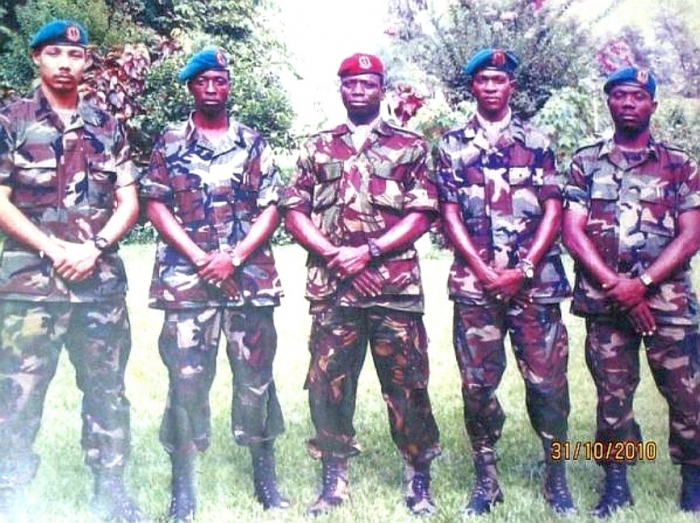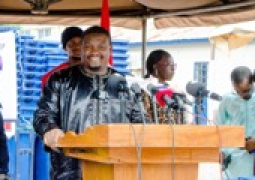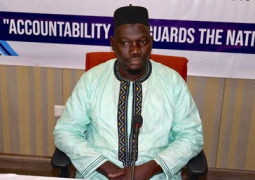
The Supreme Court, presided over by the Chief Justice Hassan B. Jallow on the 27th January 2021 found that “… Yankuba Touray is not entitled to Constitutional immunity from prosecution for alleged murder of Ousman Koro Ceesay pursuant to paragraph 13(1) (4) and (5) of the Second Schedule to the Constitution of the Republic of The Gambia.”
“Paragraph 13(1), Chapter 4, as well as the preamble (of the 1997 Constitution) thereto are contained in the same enactment. They were enacted simultaneously. They must therefore be read together… The general provision of paragraph 13 must be made subject to the specific Constitutional commitments to accountability, to justice and to the enforcement of the human rights provisions and to providing relief and remedy and accountability for the violations. To do otherwise would be to give free reign to impunity, contrary to the national commitment to justice and accountability which is enshrined in the Constitution,” CJ argued.
The issue of whether or not Yankuba Touray enjoyed amnesty for the said crime was a matter that came before Justice Ebrima Jaiteh during the trial at the High Court since 2020. On the 12th of October 2020, defence lawyer of Mr. Touray, Mr. A. Sissohor, applied to the High Court urging it to discharge the accused on the grounds that as a “junta member of the AFPRC from 1994 to 1997” and pursuant to paragraphs of Second Schedule to the Constitution of the Republic of The Gambia, enjoys immunity from prosecution.
Yankuba Touray had been adversely mentioned by several witnesses at the Truth Reconciliation and Reparations Commission (TRRC) for alleged involvement in atrocities during the former regime. One of them is the murder of the junta’s second Finance Minister Ousman Koro Ceesay, whose body was found burnt with his official car.
Appearing before the TRRC in June 2019, Mr. Touray defied instructions to cooperate with the Commission and refused to testify before it. TRRC Chairman Dr. Lamin Sise, called for Touray’s arrest after he declined a second chance to take an oath and testify before the commission.
Touray told the TRRC he would not testify because he had immunity from prosecution for any crimes he was alleged to have committed. He was, however, arrested by the Attorney General’s office amidst public outcry that nearly caused his lynching by a group of mob that converged on the TRRC sitting venue and at the Kairaba Station where he was briefly detained.
The Supreme Court, having considered both the oral and written submissions of both parties (the state and Yanks), and an Amis Curiae admitted by the Court, ruled that Yankuba Touray is not entitled to Constitutional immunity from prosecution for the murder of Ousman Koro Ceesay.
The said paragraph in question had even been amended by the Supreme Court but never reflected in the reprinted version of the Constitution. Hence an accurate version was stated in the decision as thus:
“The member of the Armed Forces Provisional Ruling Council… shall be liable either jointly or severally for any act or omission in the performance of their official duties during the administration of the… Council.”
The court granted a group of human rights lawyers, Mr. Gaye Sowe, Neneh M.C. Cham, Salieu Taal and Abdoulie Fatty acting as Amicus Curiae without objection from both parties. This is the first time the Supreme Court granted such an Amis Curiae – known as “a friend of the court.”
Mr. Sowe, Faal, Fatty and Ms. Cham appeared before the Supreme Court with strong interest in or views on the subject matter of immunity from prosecution claims by Yankuba Touray, but not a party to the action. They petitioned the court for permission to file a brief. Such amicus curiae briefs are commonly filed in appeals concerning matters of a broad public interest; e.g., civil rights cases.
However, even where the 1997 Constitution gives immunity to the AFPRC members, the Supreme Court said The Gambia is still obligated by international treaties, laws and regulations it is a part of, whether domesticated or not.
“The African (Banjul) Charter on Human and People’s Rights has, however, a special place within this body of international human rights law… the Judicial Council of the Privy Council held that whilst unincorporated treaties cannot change the law of the land or have any effect on citizens and duties in common or Statute law… [that] they might have an indirect effect upon the construction of statuses or might give rise to a legitimate expectation by citizens that the government, in its acts affecting them, would observe the terms of the treaty.”
According to Chief Justice Hassan Jallow, the Supreme Court found that the Africa (Banjul) Charter on Human and People’s Rights, whose negotiation and adoption was spearheaded by The Gambia as Africa’s premier human rights instrument officially named “the Banjul Charter” in recognition of such roles played by The Gambia.
In its elaboration, an instrument ratified by the government and legislature of The Gambia, and with Gambia hosting the Commission created and mandated by the Charter to investigate human rights violations within and by state parties, cannot, despite not having been incorporated into law, be regarded as totally relevant to the Gambia legal system.
Therefore, the Supreme Court, given the aforementioned, holds that ratification of the African Charter of Human and People’s Rights by The Gambia creates a legitimate expectation amongst people in The Gambia that The Gambia state will respect its provisions. Thus the court has a duty to interpret and apply Gambian law in a manner that does not undermine that legitimate expectation but to interpret our laws in a manner consistent with the obligations of the Gambia under the Charter, and of decisions of judicial or quasi judicial bodies established by the Charter.
About the paragraph 13(1) of the Second Schedule of the Constitution of The Gambia, Justice Jallow said the 1997 version of the clause is broadly cast as an immunity clause to shield the members of the then AFPRC, its Ministers and appointees from liability and accountability for any acts and omissions in the performance of their duties during the administration of the said AFPRC.
“Paragraph 13(1) which has been heavily relied upon in the submission for the immunity of the accused does not provide any blanket or unqualified immunity it seeks to provide….
Beyond that, there is nothing on record or claim of any link between the alleged murder of Ousman Koro Ceesay in respect of which of the accused is claiming immunity against prosecution…” it added.
Justice Jallow further read that in the preamble of the Constitution, “We the people of the Gambia” affirmed the will and resolve for gold governance and a just a secure and prosperous society. We pronounced the Constitution as providing for fundamental law, which affirms our commitment to freedom, justice probity and accountability. We made these and the other declarations of the preamble in the name of God, the Almighty.
He said it should be noted that several entrenched provisions do not provide from prosecution. The right to liberty and security of the person are duly guaranteed, making it sacrosanct that “No person shall be subject to torture or inhuman, degrading punishment or other treatment (Sec S)”.
“The court’s declaration on the Gambian Law on the subject is very much reflective of and supported by the international legal regime on the protection of fundamental rights and freedom,” he explained.
For the chairperson of the Center for Victims of Human Rights Violations, the Supreme Court judgement sends a strong message to Yahya Jammeh and his junta members that common sense laws take precedence over self-perpetuating, manipulation of the country's legal system.
"I think Yahya Jammeh would now know that he would have his day in court. One day, as far as accountability measures are concerned, victims are assured that justice will prevail at the end... Yankuba Touray, including his junta colleagues like Jammeh and others who bear greatest responsibilities in atrocities committed during the AFPRC and APRC brutal dictatorship would have to face the law and the victims."





